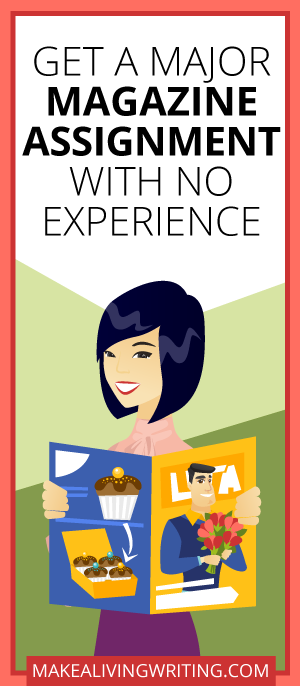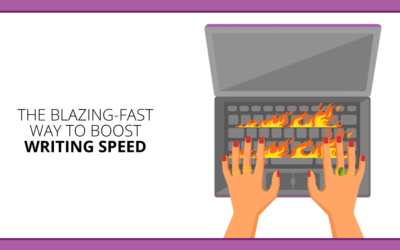Can you land a freelance magazine assignment without any clips?
If you’re new to freelancing and don’t have a lot of writing experience, it’s easy to think you can’t.
But it’s just not true.
A couple years ago, I started at ground zero. I was pitching local newspapers and charity organizations. And I wasn’t getting anywhere. Not even low-paying gigs or pro bono work.
How was I ever going to land a magazine assignment without any clips?
Fortunately, Carol set me straight. “You need to learn how to pitch successfully,” she said.
Instead of chasing dead-end clients, I decided to go big and pitch a major magazine – the kind of magazine that has a massive readership, millions in ad revenue, and a freelance budget that pays pro rates.
And it worked. Pitch accepted.
Want to know how I did it? Here’s how you can land a major magazine assignment without any clips or experience.
Magazine markets for newbies
I stumbled across a few nuggets of information about magazine writing while I was reading Writer’s Market about how to develop story ideas and write query letters.
Some major magazines work with new writers. For example, I found out that The Atlantic works with new writers and assigns 50 percent of its content to freelancers.
Want to write for a popular magazine? Start here:
- Study Writer’s Market. If you want to write for a major magazine, this is the best place to find information on what editors are looking for, guidelines, pay rates, and where freelancers fit in.
- Hint: Save yourself some time, and use the online version that makes it easy to search for magazines in your niche that pay the best rates.
Was I convinced I could land a magazine assignment with The Atlantic, after reading the guidelines? No.
Finding a paying market was just the beginning of the process.
Do your homework
There was one other interesting fact I discovered about The Atlantic. This magazine likes to feature articles about Donald Trump. Just about every magazine has recurring topics and themes they like to cover, and you can find out what they are by doing your homework.
I studied the magazine. I read a ton of back issues and looked for articles on Donald Trump. I even studied The Atlantic’s website and FAQs, to understand it’s style, voice, and audience.
And a story idea with a fresh angle on the POTUS, and his success in business and real estate started to emerge.
- Got an article idea for a magazine? Before you start writing your pitch, take the time to really get to know the magazine. Look at things like sentence structure, word count, sources, style, voice, graphics, and photos. This step will help you get into the mind of the editor, think like a reader, and refine your idea.
Dig into research
Before I could send a query letter to the editor of The Atlantic, I needed to do some research on my topic. So I mapped out a timeline of Donald Trump’s successes and failures and identified key sources who influenced his decisions.
- You don’t need to know everything on a topic to write a pitch and land a magazine assignment. But it’s a mistake a lot of new writers make, including myself. You just need to know enough to convince an editor you have a good idea. Do your research, find expert sources, and move on to writing your pitch.
Write a query letter
With enough research on my topic, I sat down to write a query letter for The Atlantic. But I kept getting stuck on a problem that stops a lot of newbie freelancers from moving forward.
Editors receive dozens of queries and pitches each day. Hundreds each week. And for a magazine like The Atlantic, there might be just 100 magazine assignments for freelancers commissioned in a year.
- How do you make your query letter stand out? There’s more than one way to do this. As a newbie writer, I didn’t have any successful query letters of my own that I could model, so I:
- Combed through advice on writing queries in Writer’s Market
- Read a book called How to Sell Every Magazine Article You Write
- Studied resources in the Freelance Writers Den
And after a lot of self-doubt, editing, and rewriting, I submitted the following pitch to News Desk Editor Scott Stossel at The Atlantic:
Dear Mr. Stossel:
Would you be interested in an article on how President Trump reinvented himself at the age of 44 and how this critical period in his life led to his decision to ultimately seek the presidency?
The article will also cover the development of many of his highly personalized approaches to issues as well as his distinctive mannerisms.
This juicy article will be a great fit for your readers especially because of the wild, sometimes funny, sometimes sad but totally unique journey the author entails.
In December 1990 Trump was living a lavish life in Atlantic City. He was just starting to feel like he was making money with his casinos and many businesses when things turned sour and life threw him headfirst into a huge crisis. Having done what his father and family had expected of him for 30 years, and still ending up bankrupt, Trump decided to do his own thing.
The article covers meaningful aspects of his life during this eventful period, which are both sad and humorous.
Among the many episodes covered are:
– Trump reinvents himself after massive infusion of loans to keep his New York real estate business from failing
– Other influences from family members and associates including Ed Koch, Fred Trump and Roy Cohn
– How he developed a conviction he could become president based on his business success
– Early plans to develop his political background from his father and Roy Cohn
This article will comprehensively explain the reasons behind his business decision to reinvent his apartment lease policies and how this major change from his father’s business practices affected his plans for the rest of his life, including his drive to run for the presidency.
Comments and quotes from his peers, including Ed Koch, will spice the article. A photo section will add a pictorial dimension.
My background includes freelance journalist and patent paralegal.
Thank you for your time and consideration.
Cordially,
Douglas Fitzpatrick
Your first magazine assignment
A few days later, I heard back from Scott. My query seemed to come at the perfect time. And I scored my first paid assignment for a major magazine. Kind of crazy.
Here’s what I learned. You don’t need a pile of clips or years of experience to land your first magazine assignment. You just need to get started.
Work through the process to identify a market, study the magazine, research a topic for a story idea, and write a query letter. That’s what pro writers do, and it’s not really any different if you’re just beginning.
The sooner you start, the sooner you’ll be signing your first contract.
Need help landing your first magazine assignment? Let’s discuss in the comments below.
Douglas Fitzpatrick is a freelance writer based in Dallas, Texas.












